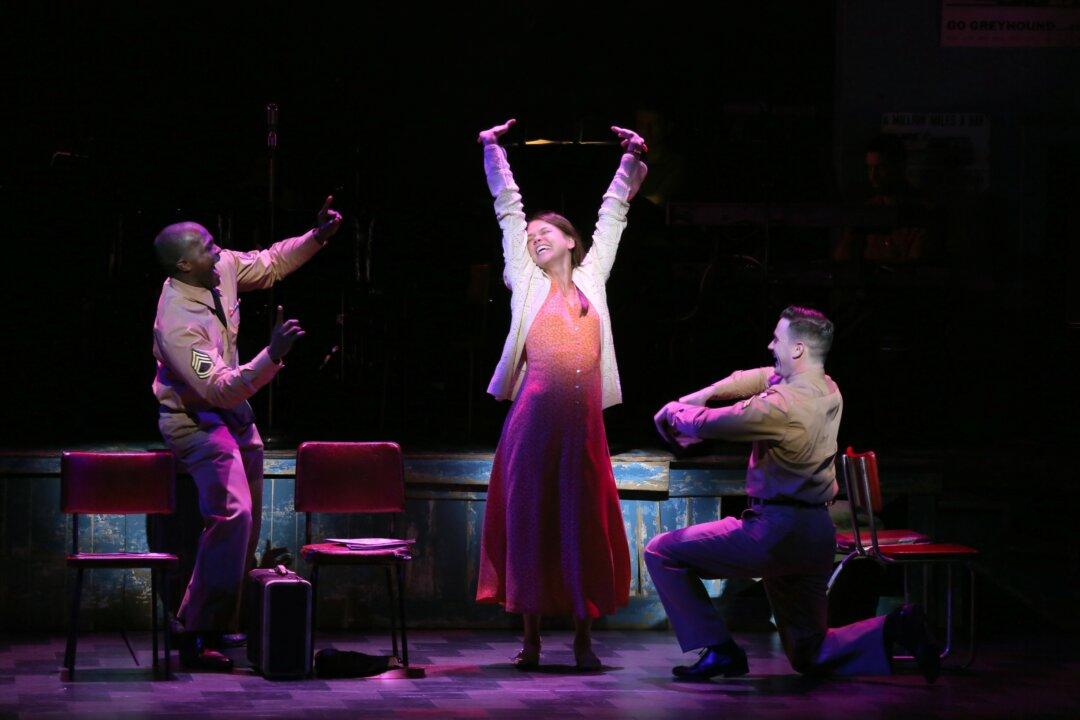NEW YORK—Who we are on the outside is not nearly as important as who we are on the inside, a lesson brilliantly brought across in the Broadway musical Violet (music by Jeanie Tesori, book and lyrics by Brian Crawley), now at the American Airlines Theatre.
Set in 1964, the story centers on Violet (Sutton Foster), who hails from the mountains of North Carolina and whose face is scarred from a childhood accident. Since then, she’s endured taunts, pity, and from those superstitious enough to believe her face is evil, fear.
Now a young woman, Violet is traveling to Memphis to see the one person she believes can heal her—a television Preacher (Levi Kreis replacing Ben Davis), who will be holding his latest revival meeting there.
Boarding a Greyhound bus, Violet falls in with the company of two U.S. Army soldiers. Monty (Colin Donnell), a corporal with a roving eye for every pretty girl he meets, and Flick (Joshua Henry), a quiet and introspective sergeant, and, as he is African-American, someone who’s encountered his own share of stares, prejudice, fear, and hatred.
As in all stories centering on a quest, it’s the journey that’s most important. Violet, Monty, and Flick each eventually let their guard down to reveal their personal insecurities.
Violet is battling not only the stigma of her scar, but also her relationship with her deceased father (Alexander Gemignani). While Violet’s accident may not have been his fault, he perhaps acted too slowly to minimize the damage.
Monty is terribly afraid of serious emotional entanglements, but after spending time with Violet, begins to wonder if there could be more to that part of life than he’s experienced so far.
Flick also feels something for Violet, but is afraid to take that next step with her. This lack of confidence is something that’s also dogged his career decisions.
One of the highlights of the show is the superb score. The different numbers, from “On My Way,” sung by the various bus passengers, to “Luck of the Draw,” to some of the solo numbers by Foster and Henry, all perfectly set the mood of the era depicted.
Most importantly, the various elements come together in a way to make one want to learn more about the different characters and what may happen to them going forward.
Foster is perfectly cast as Violet, playing the role without any makeup and coming across as a somewhat shy, plain girl with an air of hopeful desperation. She has let her accident define her.
Nonetheless, she knows how to take care of herself, plays poker with the best of them, and has a deep unshakeable faith about her journey.
Eventually Violet may just get her miracle. It just may not be the one she’s been seeking.
Gemignani is excellent as Violet’s father, a basically decent man who seems to always put off until tomorrow what he should have done yesterday. Haunted by the death of his wife and perennially sorry for past actions, he’s also someone forced to become a de facto parent, trying to raise a daughter without the necessary skills to do so.
Donnell is good as Monty, though the role is probably the most stereotypical character in the piece. A young man proud to serve his country, he’s emotionally unprepared for the kind of commitment he believes comes with a relationship with Violet. But he’s willing to see if he can make it work.
Henry is quietly powerful as Flick, someone who’s content, if not totally happy, with his place in the world—at least until Violet gives him the courage to dream bigger and go for things he never before thought possible, including an officer position in the Army and a relationship with her.
Flick’s feelings are brought brilliantly home in the number “Let It Sing.”
The rest of the cast is quite good. Emerson Steele does a great job showing Violet as a young girl and the hurt and heartbreak she experiences growing up.
Annie Golden does a nice turn as an Old Lady and Hotel Hooker, while Anastacia McCleskey is fine as a Musical Hall Singer and one of the Bus Passengers. Davis works well as the Preacher, a man currently undergoing his own crisis of faith.
Leigh Silverman’s direction is great, her efforts helping the story to move quickly with the characters all leaping off the page fully formed.
Also very good is the choreograph work by Jeffrey Page in some of the musical numbers, especially “On My Way” and “Raise Me Up,” the latter sung by the Preacher and his choir.
David Zinn’s set perfectly captures the time and place of the story, and orchestrations by Rick Bassett, Joseph Joubert, and Buryl Red are excellent.
A touching journey of self-discovery, Violet is ultimately an uplifting tale about the transformative powers we all have inside ourselves.
Also in the cast are Charlie Pollock, Austin Lesch, and Rema Webb.
Violet
American Airlines Theatre
Address: 227 West 42nd Street
Tickets: 212-719-1300 or visit roundabouttheatre.org
Running Time: 1 hour, 45 minutes
Closes: Aug. 10
Judd Hollander is the New York correspondent for the London publication The Stage.





